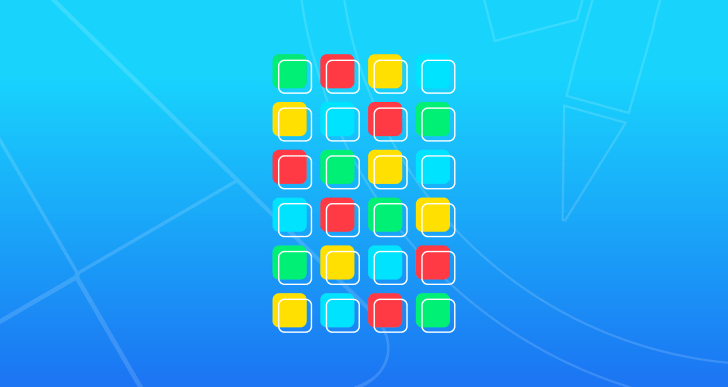Welcome back to This Week in Apps, the Extra Crunch series that recaps the latest OS news, the applications they support and the money that flows through it all.
The app industry is as hot as ever, with a record 204 billion downloads and $120 billion in consumer spending in 2019. People are now spending three hours and 40 minutes per day using apps, rivaling TV. Apps aren’t just a way to pass idle hours — they’re a big business. In 2019, mobile-first companies had a combined $544 billion valuation, 6.5x higher than those without a mobile focus.
In this Extra Crunch series, we help you keep up with the latest news from the world of apps, delivered on a weekly basis.
This week, we’re looking at the mobile news from the events that didn’t happen this year because of the coronavirus pandemic. That includes the launch of Android 11 beta, which would have normally arrived during Google I/O, along with all the new Android developer tools. Snap also held its partner summit this week, where it announced a number of new Snapchat features, new partner relationships, and its plans for its AR ecosystem.
Not to be left out, Apple stole a little attention this week with its reveal of the WWDC20 schedule. Like many others, Apple’s conference is going virtual for the first time. It’s even redesigning its forums to aid with Apple engineer-developer interactions.
This week in app trends, we examine data from new reports on COVID’s impact on home improvement apps and hypercasual gaming.
Headlines
Android 11 beta launches along with new developer tools
After a series of delays and the cancellation of Google I/O, the Android 11 beta finally launched this week. This next major version of the Android OS is focused around three themes, says Google: People, Controls and Privacy.
On the People side, Android 11 gives conversation notifications a dedicated section at the top of the shade, offers a Bubbles API for messaging apps, improves Voice Access, adds new emoji and more. New consolidated keyboard suggestions allow Autofill apps and Input Method Editors (e.g., password managers and third-party keyboards), to now securely offer context-specific entries in the suggestion strip.
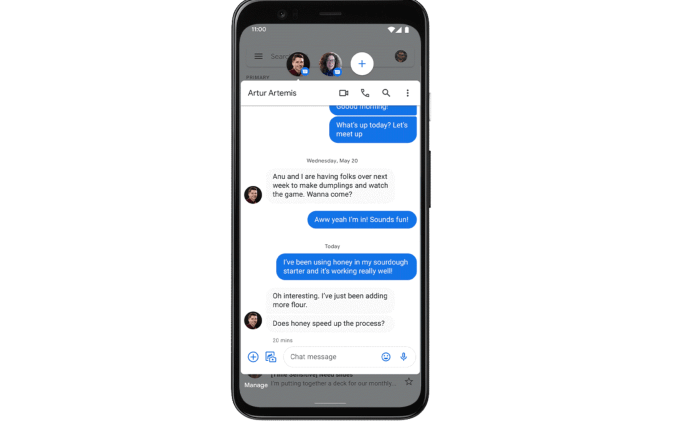
New device controls make it easier for users to access and control connected/smart home devices with a long press of the power button or access payment options. New media controls in an upcoming beta release will make it easier to switch the output device for audio or video content.

A privacy change allows users to give apps one-time access to the device microphone, camera or location. If an app hasn’t been used for an extended period of time, permissions auto-reset. Developers will need to get approval to access background location with a policy due to be enforced by 2021.

Google Play system updates, which lets Google expedite updates of core Android OS components, has doubled the number of updatable modules, with the addition of 12 more modules.
For developers, breaking changes are gated until you target Android 11 by explicitly changing your manifest. A new UI in developer options will let you toggle many of the changes for testing.
Read more about the Android 11 beta on TechCrunch here.
Android Studio 4.1 Beta and 4.2 Canary

Alongside the Android 11 beta, a new Android Studio also launched with the following updates:
- Wireless debugging over ADB with Android 11 devices. Google also added the Database Inspector and Dependency Injection (Dagger) tools.
- The Android Emulator now hosted directly inside the IDE. Tests now run side-by-side so you can see results from multiple devices at the same time. Google also improved the device manager to more easily handle your devices.
- You can now import your models for ML Kit and TensorFlow Lite directly in the IDE.
- Build and deployment are faster thanks to Kotlin Symbol Processing, caching of the task graph in Gradle, and faster app deployment to all devices on Android 11. The new build analyzer can help you diagnose where your build may have bottlenecks.
- Games tooling gets an updated performance profiler UI, an overhauled System Trace tool and support for native memory profiling.
A new Google Play Console
An updated version of the Google Play Console is built on Google Material, the design system for all Google products. It promises the following changes:
- More easily find, discover and understand important features.
- Get new guidance on policy changes, release status, advice and user feedback.
- Better understand performance insights with new acquisition reports.
- Inspect each of your app bundles and understand how Google Play optimizes artifacts for your users.
- Safely enable everyone on your team to use features with new user management options.
In practice, that means the console now offers redesigned navigation: clearer overviews that give you a snapshot of all your tracks; a renamed section called Managed Publishing (previously Timed Publishing) to see a summary of changes for review; a new guided setup for launching a new app; a new App Bundle Explorer in the “Release” section; new informational Policy status and App content sections; a new Inbox for important messages, milestones and news; new educational pages for learning how to use features; new acquisition reports focus on trend analysis; enhanced team-member management tools; and more.
Developers are asked to try the Console in beta and offer feedback about what works and what does not.
There were a number of Android-related announcements this week, including updates for Android Gaming and Play Store changes.
Kotlin, Jetpack and other developer tools
Google says that over 1,000 apps on Google Play now use Kotlin.
Kotlin 1.4 provides faster code completion, more powerful type inference enabled by default, function interfaces, along with quality of life improvements like mixing named and positioning arguments.
In addition, Google is making Kotlin coroutines, a language feature that makes concurrent calls easier to write and understand, its official recommendation. Coroutines have also been built to support three of the most-used Jetpack libraries, including Lifecycle, WorkManager and Room.
Meanwhile, Google is also bringing Jetpack forward. It’s debuting Hilt (alpha), a developer-friendly wrapper on top of Dagger, as a recommended Dependency Injection solution for Android. It added a second new library, App Startup, to help both app developers and library developers improve app startup time by optimizing the initialization of libraries. And there are other updates, as well, including a major update to Paging 3, rewritten Kotlin-first with full support for coroutines.
Jetpack Compose launched in Developer Preview 2. The alpha version is due out this summer.

Play Asset Delivery was also introduced to meet the unique needs of games, by delivering the right assets at the right time. This was done by extending the Android App Bundle publishing format — which is now used by 50% of top apps and games. Asset packs containing noncode game content like textures, materials and sounds can now be served from Google Play with large size limits, while developers can control and customize when each asset pack is downloaded to the device.
WWDC20 schedule announced

Google may have canceled its Google I/O Developer Conference, but Apple’s developer conference is still on — it’s just taking place virtually. On Thursday, Apple announced its schedule of events, including its Special Event Keynote on June 22 at 10 a.m. PDT.
WWDC20 will include many of the same features developers have come to expect from Apple’s annual event, including the keynote address, Platforms State of the Union, over 100 engineering sessions, 1-on-1 labs with over 1,000 Apple engineers, and an “all-new” version of the Apple Developer Forums.
The latter is in reference to a coming redesign of Apple’s existing Developer Forums that arrives June 18. The update is focused on allowing developers to connect with Apple engineers in a virtual environment, given they will no longer be able to do so in person. Apple says over 1,000 engineers will be available to answer questions and engage in technical discussions in the forums, starting on the first day of WWDC.
Hosting a successful version of WWDC may be difficult because it lacks the real-world interactions, serendipitous connections, in-person networking, and face-to-face technical support that Apple’s traditional developer conference offers.
Here’s a short summary:
- Special Event Keynote: June 22, 10 a.m. PDT
- Platforms State of the Union: June 22, 2 p.m. PDT
- Engineering Sessions: June 23-26
- New Apple Developer Forums: June 18 redesign, engineers arrive for Q&A June 22
- 1-on-1 Developer Labs: June 23-26
Snap Partner Summit round-up

Snap held its Partner Summit this week, which included announcements about new features coming to Snapchat as well as the company’s broader plans.
Some of the notable updates include updating Snapchat’s Lens search to support voice-based queries (e.g., “Hey Snapchat, make my hair pink!”); Local Lenses that let developers create geography-specific lenses that interact with physical locations; and a range of notable partnerships. For example, Snap announced new visual search partners like PlantSnap for foilage identification, Yuka for nutrition labels, and Dog Scanner for determining a dog breed. It’s also partnering with AR startup Wannaby to enable lenses that let users virtually try on sneakers and another with Prisma for its artistic filters.
Snap also explained how it’s collecting 3D data from users’ public snaps to extract visual data about buildings and structures in photos then turning them into 3D maps of locations. Clever and creepy.
Other big updates to the Snapchat app included the following:
- Snapchat’s AR platform is updated with voice search, Local Lenses and SnapML. Over 170 million users — more than three-quarters of Snap’s daily active users — access the app’s AR features daily. Over 1 million AR lenses have been created to date. Now the company is adding Lens voice search, a bring-your-own machine learning model update to Lens Studio, and a geography-specific AR system that will turn public Snaps into spatial data that the company can use to three-dimensionally map huge physical spaces, TechCrunch reported.
- Snapchat is redesigning its Action Bar. The app’s famously complicated navigation has again been rethought with a new action bar at the bottom that lets you access Snap Map and Snap Originals with a tap. The Snap Map will sit to the left of the chat screen while the new Discover section will highlight Snap’s original content.
- The Snap Map is introducing Places, like local businesses and other locations, as well as their associated user-submitted snaps. Imagine a social version of Google Maps that showed not just where things were and basic details, but also if they were considered hot spots among your friends and peers.
- The Discover section is getting a “happening now” module that offers a personalized stream of news, weather and other updates.
- Snapchat is getting Topic Pages and topic-themed stickers that work like hashtags. These will make it easier for users to browse the “Our Story” content in the app.
- Snap expanded partnerships with ESPN, NBCUniversal, ViacomCBS, the NBA and the NFL for new Shows ands. New shows include: Kevin Hart’s Coach Kev (Laugh Out Loud), makeup show Fake UP, dance show Move It, scripted show Frogtown about an all-girl skating crew, a scripted show about esports gambling Action Royale, Total Badass Wrestling, and more. Renewals include Dead of Night, Face Forward, Nikita Unfiltered and Vs The World.
- The first games to use the Bitmoji for Games SDK, a feature announced last year, will include Super Brawl Universe from Nickelodeon and Playsoft, Uno from Mattel, Scrabble GO from Scopely, and a soon-to-be-announced game from French startup Voodoo.
Shady TikTok rival Zynn yanked from Google Play
Zynn, a TikTok rival that’s paying users to watch videos and invite friends to join, was pulled from the Google Play Store this week. The app was already on shaky footing for its paid growth strategy, which saw it becoming the No. iOS free app. Google Play didn’t confirm why the app was removed, but it’s filled with plagiarized content from TikTok, Instagram and YouTube, Wired reported. Several creators said Zynn uploaded their content without their permission using accounts they didn’t even open.
The fact that Apple hasn’t taken action on this app is shameful.
Apple pulls podcast apps from the China App Store
Apple has pulled podcast apps, including Pocket Casts and Castro, from its China App Store per the Chinese government’s request. The Cyberspace Administration of China said the apps could be used to access content China considers illegal. The apps in question had refused to censor their content per government demands, making the choice to lose the market but keep their integrity.
Most foreign podcasts have long since been inaccessible on Apple within China before now, so the move is not surprising. The timing of the removal is also uncommon. As TechCrunch reported, before June each year, content and media platforms in China anticipate a new round of censorship as the government tightens access to information ahead of the anniversary of the Tiananmen Square crackdown.
HBO MAX hits nearly 2M downloads in 2 weeks

The mobile version of HBO MAX, the new over-the-top streaming service from WarnerMedia, has now received approximately 1.7 million downloads across iOS and Android, reports Sensor Tower, and 1.8 million according to Apptopia. The app replaced HBO NOW so many of its users were simply updated and didn’t have to download a new app. The jump in downloads has given the company its best-ever month for new downloads. Of course, not all users are downloading a mobile app — HBO NOW is also available on a number of TV devices, except Fire TV and Roku.
Twitter brings its Stories product, called “Fleets,” to India
Twitter this week announced it’s bringing Fleets, its version of Stories that lets users post ephemeral content to its social network, to India. The feature had already been in testing with users in Brazil and Italy. The concept for Fleets is to offer a way for users to post short content that will automatically disappear, allowing for a new form of expression.
Many Twitter users already use third-party apps to delete their tweets, so it’s unclear how users will approach Fleets when rolled out. After all, Twitter’s firehose already makes tweets fade into oblivion. That is, except in the case that someone is targeted for “cancellation” by those who dig up years-old tweets that often no longer represent current views. But if Fleets prompt more users to post thoughts to the tap-through Stories format, Twitter will lose much of its scrollable content. The product seems shoehorned into an app that was already about ephemerality but simply lacks an archive feature.
Coronavirus lockdowns boost Home Improvement apps
App Annie looked into the impact the coronavirus lockdowns had on home improvement retailers’ apps. According to its findings, Home Depot saw 195% growth in May 2020 compared with January 2020, while Lowe’s saw 205% growth. Increased time at home also boosted downloads for digital-first retailer Wayfair by 85%. Pinterest moved up 11 ranks to No. 21 in May in the U.S., also due to increased interest in home projects.
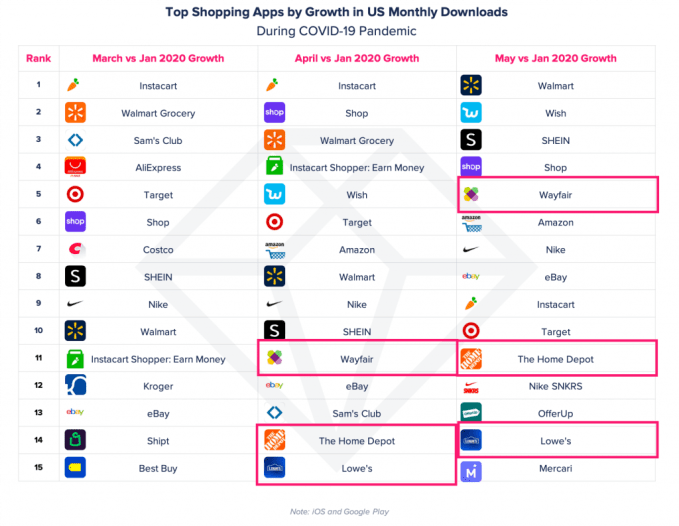
The companies have taken a variety of approaches to adapting their businesses for the COVID era. Lowe’s, for example, recently launched Lowe’s for Pros JobSIGHT powered by Streem, an AR video chat service where its professionals conduct virtual home visits and consultations with customers. Wayfair also uses AR to help customers visualize furniture in their home. Pinterest, meanwhile, added a way to shop from its Lens camera search results.
Mobile World Congress cuts 20% of workforce
Following the cancellation of the massive mobile event in Barcelona this February, the GSMA says it’s now cutting 20% of its workforce to ensure its MWC events will continue in 2021 and beyond. Typically, MWC accounts for as much as 80% of the trade group’s annual revenue. The company had 1,000 staff.
Tinder attempts a positive spin on the pandemic
In a Verge interview, Tinder CEO Elie Seidman claims engagement is up in terms of length and number of conversations among users during the pandemic. It’s unclear if Verge bought the PR spin, as the interview was printed verbatim and the headline focused on a feel-good story of finding love.
The reality is that the pandemic has not been great for mobile dating apps. It’s even forcing Tinder to pivot its model to one of finding “global friendships” with the development of a new “Global Mode” feature and the launch of video chat, planned for June.
Tinder in Q1 2020 (ended March 31, 2020) already reported declines in price per paying users, both in terms of a shift to lower price skews and declines in à la carte purchases, it said. Non-paying user growth was flat in the quarter. And overall revenue growth at Tinder was negatively impacted by the coronavirus outbreak, the company had admitted during its earnings call.
The full impact of the pandemic may not have been seen yet. Tinder parent Match’s stock was up after its Q1 earnings thanks to its double-digit revenue growth that beat Wall Street expectations. But the engagement numbers it’s citing seem to be the result of quarantine boredom — matching and longer chats, for example, don’t necessarily translate to dollars and cents.
Adjust and Unity release hypercasual gaming report
On Wednesday, Adjust and Unity released a new report about the performance of hypercasual gaming apps based on a snapshot at Q1 performance. The report dives deep into one of the highest-performing game genres during COVID-19, and offers information about the overall success hypercasual continues to see.
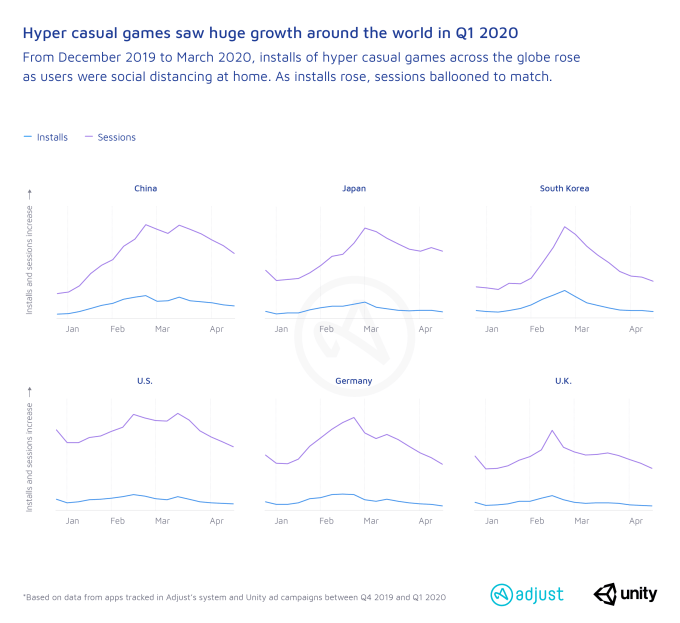
Some major takeaways include:
- Gameplay grew by 72% in March globally.
- Game downloads grew by 103% globally.
- China led with a 300% increase in sessions between December 2019 and March 2020, while Korea registered a 152% increase.
- Sessions in Japan and Germany rose by 137% and 69%, respectively.
- On the lower end of growth, U.S. sessions increased by 35%, and rose 34% in the U.K. Because hyper-casual users in the U.S. are already heavy gamers — contributing to 15% of the global sessions based on an average from December 2019 to April 2020 — the increase was not as large.
- While overall CPIs decreased by 35% by the end of March, the cost of acquiring hypercasual users in the U.S. is more than double that of EMEA ($0.19). However, marketers can expect the highest conversion rates (17%) from the U.S.
Funding and M&A
- Chicago-based M1 Finance raises $33 million Series B led by Left Lane Capital. The company had previously crossed $1 billion in assets under management for its smart money management and investing app.
- Interactive storytelling app Whatifi launches with $10 million in funding from Andreessen Horowitz and former Netflix CFO David Wells, among others. The app allows users to watch films together and decide how the story is told.
- Instacart raises $225 million at a $13.7 billion valuation for its grocery delivery service. The round was led by DST Global and General Catalyst. The app has grown substantially since the coronavirus hit, with orders up 500% this year.
- ClassTag raises $5 million for its parent-teacher communication app that helps parents get info on school events, like field trips and fundraisers, schedule parent-teacher conferences, share resources, and more.
- European company Just Eat Takeway acquires U.S.-based Grubhub in an all-share deal for an enterprise value of $7.3 billion. Uber Eats had also tried to acquire the company.
- Conversa Health raises $12 million Series B for its digital health app providing virtual care and communication.
- Facebook’s internal R&D group, NPE Team, has hired a head of investments
More reading
In India, the YouTube-TikTok Rivalry Turns Nasty: Bloomberg Businessweek takes a look at the internet battle with geopolitical overtones. The Indian market with its half-billion internet users is a key battleground for the two video giants, and the fastest-growing for both apps.
Demonstrating 15 contact tracing and other tools built to mitigate the impact of COVID-19: A TechCrunch feature looks at the leading U.S. apps for contact-tracing both with and without the use of the Google/Apple API and other personal symptom tracking apps.
Downloads
Photoshop Camera

Adobe this week launched a new app called Photoshop Camera. This intelligent camera app lets you add filters and effects — even before you take the photo. It also offers a series of creative lenses created by artists and influencers, including Billie Eilish. Photoshop Camera is powered by AI and machine learning technology Adobe has developed, which allow the app to offer features like real-time effects, auto-tone and content-aware recommendations — meaning the app can pick the best effects for you.
Over 80 custom filters are included like Portrait, Studio Light, Bloom, Pop Art, Spectrum, Desync, Food, Scenery, Natural Skies, Analog, Night Shift, Comic Skies, Interstellar, Dreamcatcher, Celestial, Supersize, Double Expo, Prism, Color Echo, Mixed Media, Blue Skies, Artful and more.
Pastel

A new app for developers and/or designers from developer Steve Troughton-Smith, Pastel lets you build up a library of custom color palettes, offering an easier way to keep track of the colors you’re using in your projects. The app supports iCloud syncing, drag & drop on iPad, and includes a variety of color pickers like wheel, RGB sliders, and crayons, or you can pick named colors from your color library that you curate yourself. The free version includes a built-in library with support for palettes up to 20 total items. Unlimited is available as an in-app purchase.
Anonymous Camera
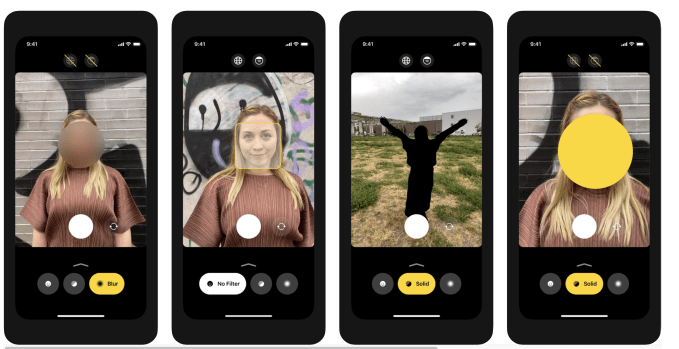
The Anonymous Camera app anonymizes camera footage by recognizing faces then allowing you to apply a solid color, noise or blur to the image, including either a person’s face or full body. You can also remove metadata. All processing is done locally on the device in real-time and everything is locally stored.
Podhero
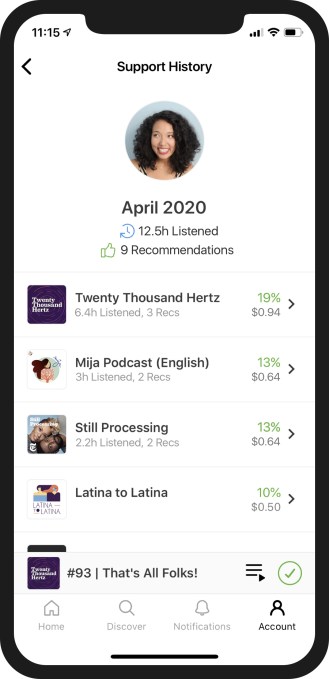
A new podcast app, Podhero, lets you pay your favorite podcaster via a subscription. The startup is led by Pete Curley and Garret Heaton, who previously founded HipChat (sold to Atlassian) and launched Swoot last year. The founders explained that 97.2% of podcasts aren’t monetizing and only 1.4% of podcasts have ads. Subscriptions would allow podcasters to increase their revenues, but unlike subscription podcast app Luminary, Podhero isn’t asking users to pay for exclusive content. Instead, it’s taking a Patreon approach to podcasting where $4.99 of the app’s $5.99 per month subscription fee is divided up among podcasts. The app has over 1 million podcasts, but only shares the money with podcasters once they claim their profile.
Other notable updates:
- Signal’s private messaging app now lets you transfer your chat history to a new iPhone.
- Apple adds anonymous symptom and health info sharing to its COVID-19 app.
- WhatsApp fixes issues that exposed users’ phone numbers in Google search results.
- Rave’s app now lets users virtually watch Amazon Prime Video with friends, in addition to Netflix.
- Google Play Store app adds a “Premium” section for games that work well on Chromebook.
- Fleksy rolls out an SDK for its AI keyboard for white labeling.
